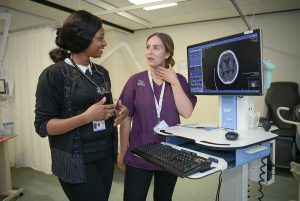Speech and language therapists provide life-changing treatment, support and care for children and adults who have difficulties with communication, eating, drinking and swallowing. You’ll help people who, for physical or psychological reasons, have problems speaking and communicating. Patients range from children whose speech is slow to develop, to older people whose ability to speak has been impaired by illness or injury. It also includes treatment for those who have difficulty with eating or swallowing. 
Variety is one of the most exciting things about being a speech and language therapist. As well as helping patients with a variety of conditions, you’ll work in a multi-disciplinary team in different settings from hospitals to community clinics to patients’ homes.
You’ll help children with a variety of conditions including:
- mild, moderate or severe learning difficulties
- language delay
- specific difficulties in producing sounds
- hearing impairment
- cleft lip and palate
- stammering
- voice disorders
- selective mutism
- developmental language disorder.
You’ll help adults with:
- communication or eating and swallowing problems following neurological impairments and degenerative conditions, including stroke, head injury, Parkinson’s disease and dementia

- voice problems
- mental health issues
- learning difficulties
- physical disabilities
- stammering
- hearing impairment
You would also work closely with other health professionals, such as doctors, nurses and psychologists. You may also supervise the work of speech and language therapy assistants.
Speech and language therapy could be the right profession for you if you enjoy science, education, languages, linguistics or medicine.
 In this section
In this section